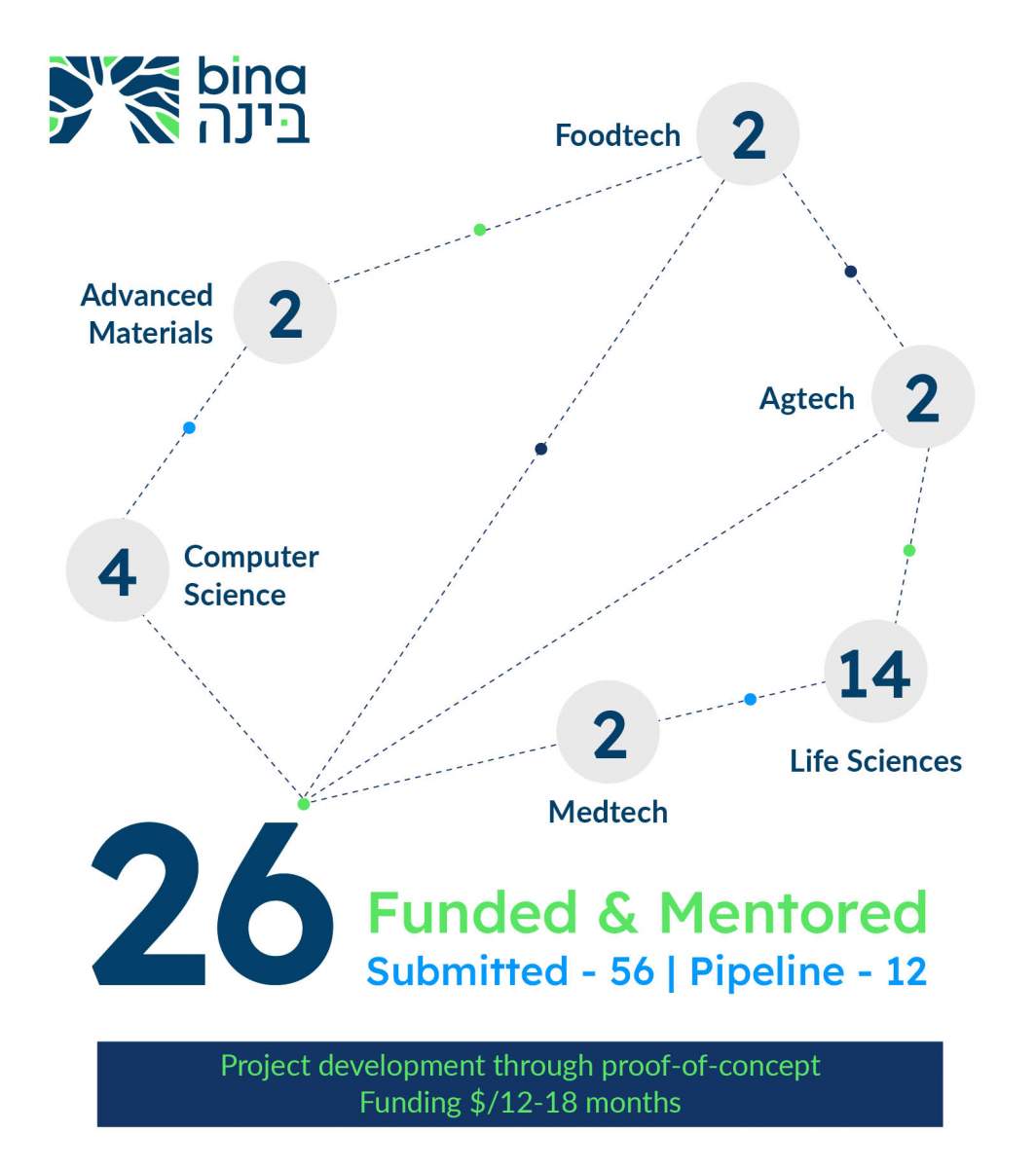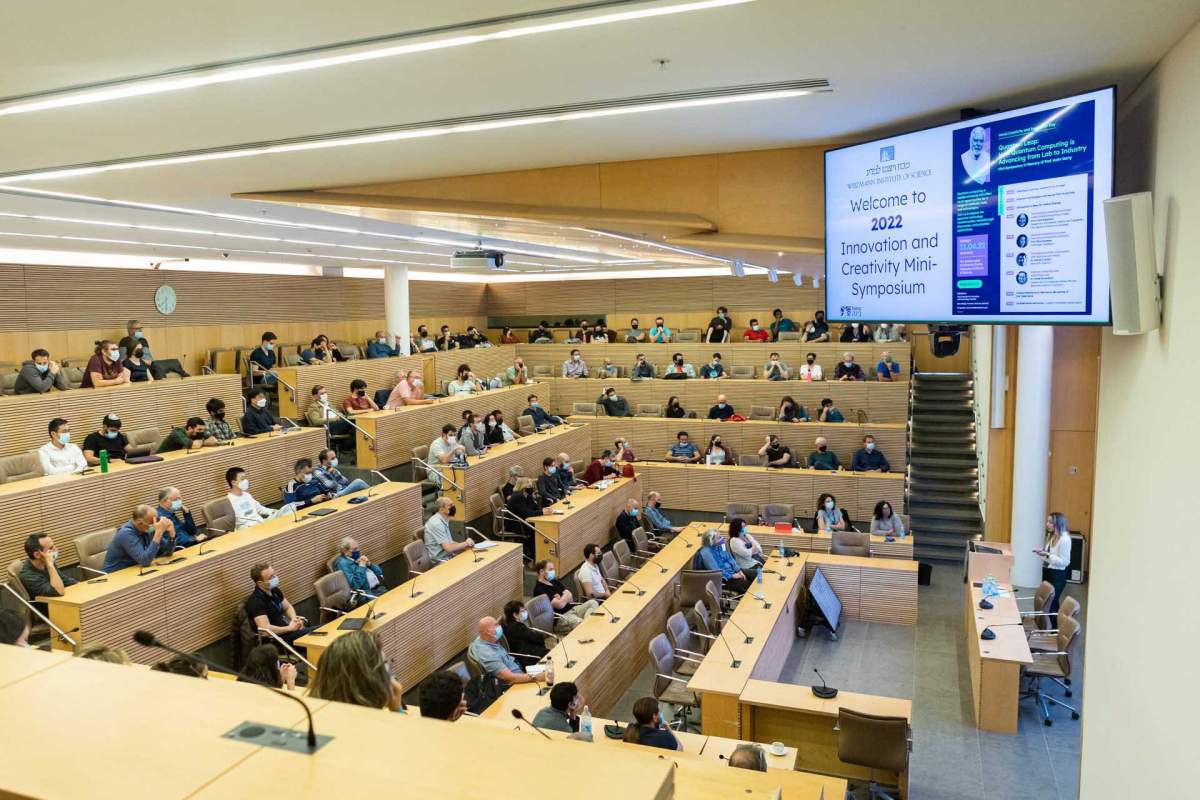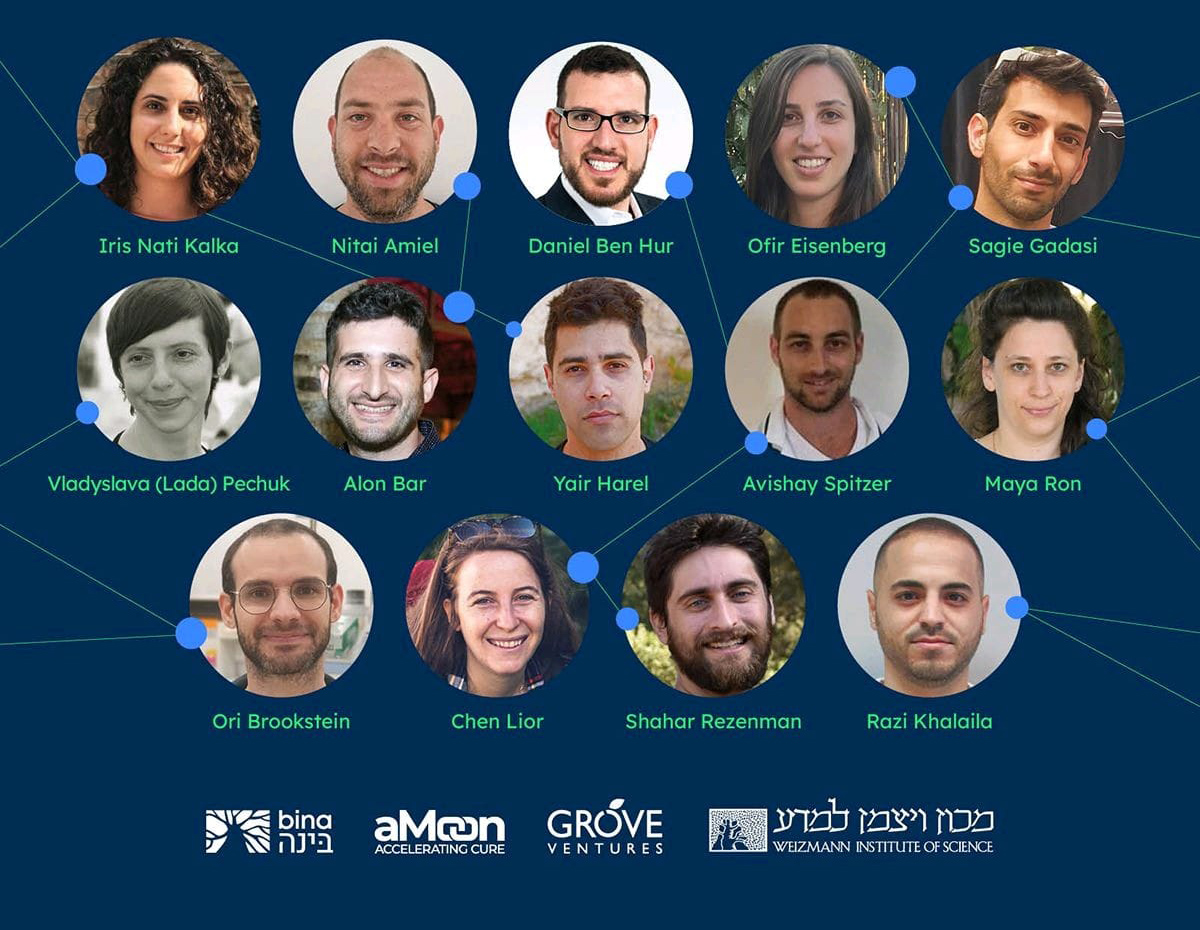Are you a journalist? Please sign up here for our press releases
Subscribe to our monthly newsletter:
Weizmann Institute researchers are experts in leading scientific research in an academic setting: coming up with a groundbreaking basic research hypothesis, conducting research to validate that hypothesis, publishing their findings in a prestigious journal, and becoming leaders in their scientific domain. Conducting research that conforms to clinical or industrial standards, however, is a different matter. This requires designing a research plan that leads up to a working proof of concept, as well as an industry-oriented evaluation process that takes into account technology, novelty, and feasibility from potential intellectual property, market perspectives and industry standards.
Cue Bina, a new link in the chain intended to nurture and develop basic research projects and technologies. Bina, which stands for “Bridge, Innovate, Nurture, Advance” and means “wisdom” in Hebrew, collaborates with researchers to build a work plan custom-tailored to the scientist and their project. The Bina team guides projects towards a working proof of concept, after which they are duly referred to the next, veteran link in the chain: Yeda, the commercial arm of the Weizmann Institute.

“Basic research motivated by scientific curiosity is key to innovation, and the core of the Institute’s endeavors. But how do you translate scientific innovation to technological innovation?” said Prof. Irit Sagi, who envisaged Bina and created it alongside Yeda in early 2021. When Prof. Sagi, a Principal Investigator in the Immunology and Regenerative Biology Department, became Vice President of Innovation and Technology Transfer, she noticed that it was “the same small group of scientists who were approaching Yeda again and again,” she recalls. “I realized there was a gap between the labs and the commercial arm of the institute. That is, between scientific innovation and technological innovation — and that this gap needs to be bridged. This is where Bina comes in.” Prof. Sagi adds: “We created Bina to support research with applied potential as soon as that potential is identified, long before patent registration or commercialization. We hope to expose Institute scientists to fields that are closely associated with their areas of expertise like medicine, sustainability, and knowledge-rich industries so that they can achieve a practical impact on humanity in addition to the theoretical impact they are accustomed to having.”
"We created Bina to support research with applied potential as soon as that potential is identified, long before patent registration or commercialization"
A campus-initiated innovation hub geared primarily toward serving its scientists, Bina is evolving rapidly. “We’re doing something new and learning as we go along. The potential is huge, and we’ve already had some successes,” says Dr. Sharon Fireman, Head of Bina. “Our role is to provide guidance to researchers looking to break the bounds of their lab and academic research. We aim to help drive their basic science toward applications.” Bina is currently nurturing and funding 26 projects – including 14 in life sciences; four in food and agricultural technology and another four in computer science – which receive customized guidance from industry experts with 12 additional projects in the evaluation stage. “The opportunity to receive such guidance is open to all research scientists by filling out a short application form on our website,” Dr. Fireman said. Bina’s message to researchers is unambiguous: come all!
Dr. Fireman brings to the role over 15 years of experience in R&D, innovation management and business development in the pharmaceutical and biotech industries, including in companies such as Teva Pharmaceuticals and Sol-Gel Technologies. As a new initiative, Bina is a lean operation, but the team is expanding. It has recently welcomed Dr. Merav Marom, a project manager with vast experience in life-science projects, who is responsible for Bina’s ongoing activity. Bina relies on a network of industry experts, as well as Yeda’s commercial directors, to guide the scientists toward realizing their ideas. Bina helps them draw up a work plan and the scientists receive the support they need to reach plan milestones, culminating with a proof-of-concept and patent application. In addition to the core team, Bina’s activity is guided by a steering committee comprised of academic and industry professionals and headed by Prof. Tony Futerman of the Biomolecular Sciences Department. Additional members include Prof. Michal Irani of the Computer Science and Applied Mathematics Department; the CEO of Yeda, Dr. Opher Shapira; Dr. Michal Preminger, Regional Head of Innovation at the pharmaceutical giant Johnson & Johnson; and Prof. Gabi Barbash MD, MPH, Director General Emeritus of Israel’s Ministry of Health and Director of the Weizmann Institute’s Bench-to-Bedside Program.

"Some of the researchers don’t reach us directly; instead, they are referred to us by Yeda. This happens when they have an initial idea for a patent requiring further development before reaching the patent stage,” explains Dr. Fireman. “Prior to the founding of Bina, the scientist would have to go back to the lab and complete the research on their own. Today Bina guides the scientists, and we help them develop the next steps on the path to fleshing out new technology. Researchers who enlist our help already have an idea, and they know what they want to achieve — but additional steps are required before the transfer to Yeda,” Dr. Fireman said. Bina is responsible only for the scientific nurturing of projects. Yeda is the entity which is responsible for the commercial pursuit of Weizmann projects.
"Prior to the founding of Bina, the scientist would have to go back to the lab and complete the research on their own. Today Bina guides the scientists"
The consultants who guide the projects in collaboration with Bina are industry experts from the fields relevant to the scientist’s project. The experts, as well as the guidance provided, are selected and tailored to the specific needs of the researcher and the project. “Part of what we do is find an expert who can bring true added value to the project. We recruit our advisors in a variety of ways: sometimes these are people we know from our professional history; sometimes they are industry executives we meet at academic and industry conferences; and of course, our best connections come through the Weizmann Institute Alumni Association,” says Dr. Fireman. “These experts come to us with dual motivation: they want to support the Institute researchers, but they are also looking to partake in scientific activity at the very edge of innovation. Their involvement in Bina allows them to revisit the scientific environment they come from and which sparked their passion for their field.” Bina is always looking for new advisors and invites experts across all fields to reach out via this link for potential collaborations.

Another way in which Bina provides a service to the scientific community is via Spotlight events: Professional brainstorms intended for scientists who have already developed a wide platform or technology and even secured funding to develop their idea further, but require advice and guidance from industry professionals to explore potential collaborations and applications. The most recent Spotlight event was held in July, featuring Prof. Ehud Ahissar, Head of the Embodiment of Perception lab at the Brain Sciences Department. Over 15 advisors from a variety of fields were invited to brainstorm potential applications for the Dynamical Recurrent Visual Perceiver technology developed in his lab. The perceiver performs various visual tasks using biomimetic elements integrated within standard AI systems. The experts included Menashe Ezra, managing partner at the venture capital firm Gemini Israel; Inon Beracha, an experienced entrepreneur with a consumer electronics background; and Dr. Haim Amir, CEO and founder of Essence Group. Prof. Ahissar shared this technology with this panel of experts, and together they explored potential clinical, agricultural, security and automotive applications.
“The Spotlight event resulted in leads for possible research avenues,” shares Dr. Fireman. Institute scientists interested in participating in a Spotlight event or other Bina programs are of course invited to contact Bina.

Bina also initiates collaborations with other clinical and academic institutions. These efforts have resulted in cooperation between Dr. Moshe Biton of Weizmann’s Immunology and Regenerative Biology Department and Dr. Nissan Yissachar of the Institute of Nanotechnology and Advanced Materials at Bar Ilan University. Another presently ongoing collaboration involves the Innovation Unit at the Shamir Medical Center (Assaf Ha’rofe): Prof. Brian Berkowitz of the Planetary and Earth Sciences department has partnered with Prof. Lior Heller, Director of the Department of Plastic Surgery, in an attempt to find an innovative approach for treating lymphedema.
Considering the challenges facing our planet, FoodTech is one of the most promising, fastest-growing technological fields today, and another of Bina’s focal points. The innovation hub identified the great potential inherent in knowledge and technology transfer from life and plant science researchers and initiated new FoodTech projects. The Bina team is guiding those in collaboration with professionals from the food industry.
Principal Investigators are Bina’s main target audience, but they are not the only ones. Staff scientists, whom Prof. Sagi considers the research backbone of the Institute, are also targeted. “While students typically come to the Institute for brief periods of time, staff scientists make their careers here. They are a cornerstone of expertise and professionalism. Empowering staff scientists and expanding their knowledge in the field of applicative science is important on an infrastructure level,” Prof. Sagi said.
Bina has just wrapped up a program for staff scientists developed in collaboration with the Leeds School of Business at the University of Colorado. Last month, a three-day workshop was held for 16 staff scientists who were selected for the program out of dozens of applicants. The program was designed to help staff scientists assess their labs’ research from an applicative and industry standpoint. The program also aimed to help create a staff scientist network that allows members to collaborate with each other on innovative projects. “I learned so much over those three days and had so much fun along the way,” said Adina Weinberger, Senior Staff Scientist at the Computer Science and Applied Mathematics Department. “It was such a privilege.”
"These students are in the labs, getting their hands dirty. When they come across an interesting technology, they’ll know to refer it to us”
Another demographic Bina includes in its activities is students, whom Bina regards as additional drivers of innovation at the Institute. The first Bina Innovation Fellowship, a prestigious program for Ph.D. Students, came to a close this past summer. Fourteen carefully selected participants received comprehensive training over the course of four months to understand the basics of applied research projects evaluation. Bina and the Feinberg Graduate School developed this educational program in collaboration with the venture capital firms aMoon and Grove. “These students are much closer to scientific activities than Bina staff. They’re in the labs, getting their hands dirty,” explains Dr. Fireman. “When they come across an interesting technology, they’ll know to refer it to us.”

“The issue of student career development is near and dear to my heart. I remember walking in their shoes,” recalls Dr. Fireman. “They don’t always know what professional steps to take after their degrees. Programs designed to help them develop their careers — whether in academia or industry — are paramount,” she added.
Whether you are a student, post-doc, staff scientist, or PI — Prof. Sagi invites the entire Weizmann community to reach out to Bina with any idea, question, or request for support. “As the Institute’s scientific unit responsible for the interface between academia and industry, we want to hear about any ideas you have and offer you ways to help you transform them,” she said.